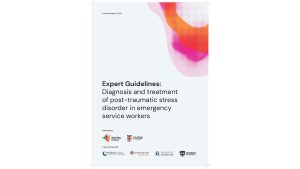Post-traumatic stress disorder expert guidelines for emergency service workers
In Australia, there are more than 350,000 full time and volunteer emergency workers. They perform a vital role in protecting citizens and providing assistance during emergencies. As a result of their duties, emergency workers are regularly exposed to potentially traumatic experiences. There is increasing awareness of, and concern regarding, the possible psychological consequences of trauma exposure amongst emergency workers.
Post-traumatic stress disorder (PTSD) is a severe and persistent mental health impairment that can occur following exposure to a single or multiple traumatic events. An individual with PTSD typically has four clusters of symptoms: re-experiencing symptoms; avoidance symptoms; negative cognitions and mood associated with the traumatic event; and arousal symptoms, including insomnia and irritability. The most up-to-date literature estimates that around one in 10 emergency workers are currently suffering from PTSD, although rates are likely to be even higher if retired emergency workers are considered. Over recent years, a substantial body of evidence has revealed best practice approaches to treating PTSD.
There are now several psychological and pharmacological treatments known to be effective at both reducing PTSD symptoms and improving functioning. PTSD regularly presents with co-morbid conditions such as major depressive disorder and substance use disorder. The guidelines presented in this report aim to utilise a combination of expert opinion and the best available research evidence to produce succinct, focused guidelines on the diagnosis and treatment of emergency workers with PTSD.
A panel of six of Australia’s leading experts in PTSD with expertise in psychiatry, clinical psychology, general practice, epidemiology and occupational medicine was assembled to develop the guidelines summarised in this document.
Further resources
Learn about the signs and symptoms on this Australian Government health and wellbeing portal for veterans and their families.
Case Study – Post-Traumatic Stress Disorder
Flashbacks and an increasingly short temper made 20-year infantry veteran Mick think he might have an issue with post-traumatic stress.

